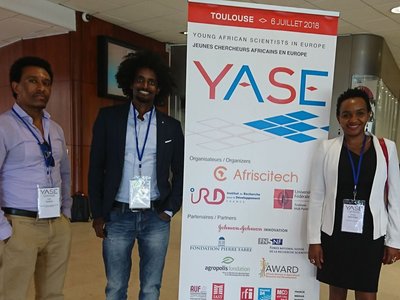

“Build your skills, create networks and search for opportunities” was the key message at the final plenary session of the Young African Scientists in Europe (YASE) conference. It took place for the first time on the 6th of July 2018 in Toulouse, France.
The aim of this platform was to show and discuss the potential of African doctoral students and post-doctoral scientists in Europe, to present initiatives and foster networking that enable young African scientists to contribute to the scientific and technological advancement of their continent. More than 30 scientists, company representatives and policy-makers from Africa shared and discussed their experiences and their visions. More than 300 people participated, among them three APPEAR scholarship holders and current PhD candidates in Austria.
“As one of the young scientists from Africa I used this golden opportunity to connect with like-minded people and discussed possibilities of working together for the betterment of Africa” says Hafte Mebrahten Tesfay. The doctoral student adds, “The discussions made on how to foster a good working environment for African Europe graduates and how to start up connections with projects and working in Africa with collaboration of European projects inspired me.”
Limited infrastructure and research facilities at African Higher Education institutions sometimes make high quality research difficult and prevent highly qualified researchers from returning to Africa. How to work in this kind of environment and to overcome difficulties as well as to build up networks were also discussed. Kidia Kessiee Gelaye comments that “during the conference, the challenges African institutions are facing were discussed, however I also experienced the intellectual opportunities.”
Sonnia Musyoka concludes “YASE was a great opportunity to link, network and share with renowned African scholars who, after studying abroad, dedicated their career back to their African countries to serve and develop their continent.”
Kidia Kessiee Gelaye is an Ethiopian PhD candidate at the Institute of Hydraulics and Rural Water Management, at the University of Natural Resources and Life Sciences, Vienna (BOKU). His dissertation focuses on tackling the irrigation agriculture salinity problems in the arid area of Afar Region in Ethiopia. He obtained his BSc at the Jimma University of Ethiopia in 2008 and he got his MSc at BOKU University, Austria in 2013. Previously he worked at Samara University of Ethiopia.
Sonnia Musyoka is a PhD researcher at the University of Natural Resources and Life Sciences, Vienna (BOKU). She is employed in Kenya as Tutorial fellow at South Eastern Kenya University. She is also a senior consultant at the Human Development International and a Sustainable Aquaculture Technical expert and trainer at DNV GL Kenya. She has more than 10 years of local and international experience in consultancy and training on capacity building for fisheries and aquaculture as well as climate smart agricultural practices towards sustainable livelihoods.
Hafte Mebrahten Tesfay received his MSc degree in Agroforestry from Hawassa University, Ethiopia. From 2006 – 2010 he served as an expert of Soil conservation and Head of Land administration and Environmental protection in one of the Ethiopian districts. He was a Lecturer and researcher at Dilla University and later at Hawassa University, Ethiopia. Currently, he is a PhD student at the University of Natural Resources and Life Sciences, Vienna (BOKU). His PhD study focuses on researching the plant diversity, carbon pools, selected soil properties and livelihood situation in the indigenous ggroforestry systems of South-eastern Rift-Valley landscapes, Ethiopia.
